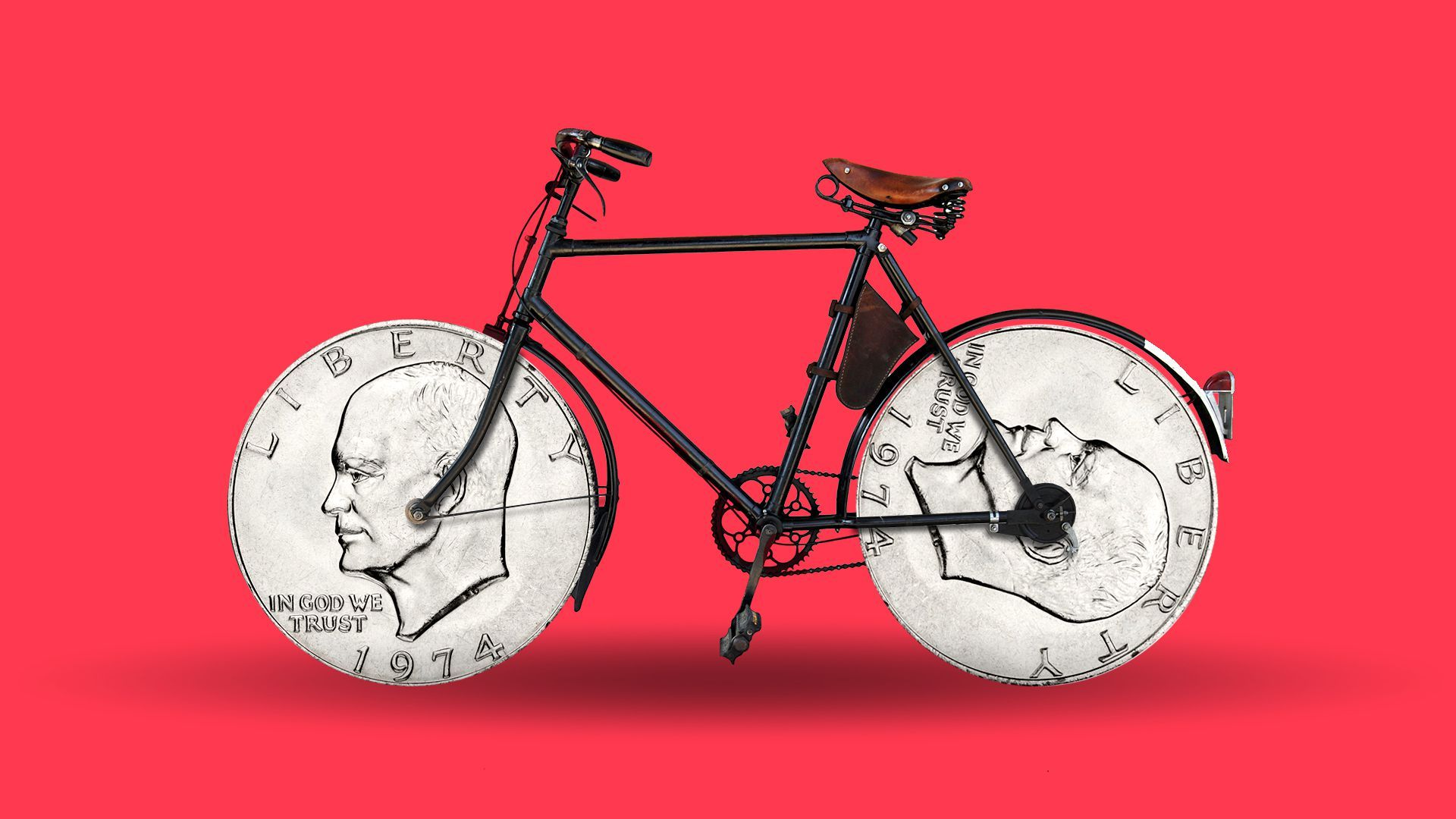| | | | | | | Presented By Coalition Against Surprise Medical Billing | | | | Vitals | | By Caitlin Owens ·Dec 11, 2020 | | Good morning. Join me and Axios Pro Rata on Saturday for a Peloton fundraising ride! - The proceeds will benefit Restaurant Strong, a fund that provides cash grants to full-time restaurant workers who have been negatively impacted by the pandemic.
- More details (including how to participate if you're not a Peloton user!) are at the bottom of the newsletter.
Today's word count is 1,116, or a 4-minute read. | | | | | | 1 big thing: Jumping the line for a vaccine will be pretty easy |  | | | Illustration: Aïda Amer/Axios | | | | After the first round of coronavirus vaccines is administered, state and local officials largely will not be able to ensure that the rest of the process puts high-risk people first. Between the lines: Experts have spent months debating the ins and outs of a complex prioritization system for these vaccines, all in the hopes of saving as many lives as possible. But the actual process will likely rely heavily on the honor system. The big picture: It'll be relatively easy to ensure that the highest-priority groups — health care workers and nursing-home residents — are the ones who actually receive the first vaccine doses because hospitals and long-term care facilities can just go through their staff and resident rosters to figure out who should be offered a vaccine. - But after that, enforcement gets harder. Experts have said the next round of doses should be focused on people who are most at risk to catch or spread the virus, or for serious illness. That would include many service workers and people with underlying health conditions.
- But there aren't great enforcement tools to make sure that's how things work.
- "Eventually you'll get to the point where there's a lot of providers and distribution points involved in this plan, and it's going to be harder and harder to ensure you adhere strictly to these priority groups. I'm sure there will be a point where we see line jumping," said Josh Michaud, associate director of global health policy at the Kaiser Family Foundation.
Providers will likely have to take people's claims that they're members of certain priority groups at face value. - "I doubt they're going to require a lot of documentation. If you say you have diabetes, they're not going to want to see your blood sugar," said Eric Toner, a senior scholar with the Johns Hopkins Center for Health Security.
Go deeper. |     | | | | | | 2. The hurdles we face before reaching herd immunity |  | | | Illustration: Sarah Grillo/Axios | | | | Once 75%–80% of people get vaccinated against the coronavirus, there should be strong enough herd immunity that we can return to normal activities, NIAID director Anthony Fauci tells Axios' Eileen Drage O'Reilly. The big picture: Mass vaccination faces a myriad of hurdles that must be overcome — nationwide planning and logistics, vaccine production, public distrust, and lingering scientific unknowns. - But "if you have 75%–80% of the people get vaccinated, you create an umbrella of herd immunity — that even though there is virus around, it is really almost inconsequential because it has no place to go, because almost all of the people are protected," Fauci said.
But several hurdles have to be addressed, several public health experts say. - Sustain current public health measures, like mask wearing and social distancing, while the vaccines are rolled out and distributed.
- Determine logistics and an equitable distribution of vaccines. Several of the vaccines have strict cold-chain requirements that require planning, and there's concern the most vulnerable may not get access quickly.
- Address misinformation. "We need strong scientific communicators" to explain the terminology and what people should expect, Julie Fischer, senior technical adviser for global health at CRDF Global, tells Axios.
- Explain the science behind vaccines, particularly mRNA ones.
- Continue gathering scientific data about remaining scientific unknowns in a transparent way.
Go deeper. |     | | | | | | 3. The latest in the U.S. |  Data: The COVID Tracking Project; Note: Does not include probable deaths from New York City; Map: Andrew Witherspoon/Axios A Food and Drug Administration advisory panel recommended the approval of Pfizer and BioNTech's coronavirus vaccine for emergency use on Thursday in a 17-4 vote that included one abstention. New Hampshire House Speaker Richard "Dick" Hinch died of COVID-19, the state's attorney general's office said Thursday, citing the autopsy report. He was 71. House Majority Whip Jim Clyburn (D-S.C.), the chair of the oversight subcommittee tasked with looking at the coronavirus crisis, accused the head of the Centers for Disease Control and Prevention on Thursday of concealing evidence that a Trump appointee attempted to influence the agency's scientific case studies. Governors in Oklahoma, Pennsylvania and Virginia announced fresh coronavirus restrictions for their states on Thursday as the number of cases across the U.S. climbs. |     | | | | | | A message from Coalition Against Surprise Medical Billing | | Stop surprise medical bills with fair, market-based prices | | |  | | | | Fair, market-based payments for out-of-network services will save taxpayers $25 billion over the next decade. The choice for policy-makers is clear: provide relief for more than 100 million Americans or give a hand-out to private equity firms. Stop surprise bills with fair, market-based prices. | | | | | | 4. The latest worldwide |  The current scarcity of the vaccine looks like an economics problem — too much demand, and not enough supply. But no one is seriously proposing a market-based solution, where the vaccine goes first to those willing and able to pay to jump to the front of the line, Axios' Felix Salmon writes. GlaxoSmithKline and Sanofi announced a delay in their COVID-19 vaccine project on Friday, saying they planned to launch a new study next year. Israeli Prime Minister Benjamin Netanyahu announced on Wednesday that Israel will begin vaccinating the public against the coronavirus on Dec. 27, with plans to inoculate 60,000 people daily. Canada joined the U.K. and Bahrain in approving the Pfizer/BioNTech vaccine on Wednesday, with vaccinations expected to start next week. The UAE approved a vaccine from China's Sinopharm. While the data available around the vaccine is limited, the UAE reports that it's 86% effective. Argentina's president is putting his faith in Russia's Sputnik V vaccine, saying he'll be the first in line to get it. |     | | | | | | 5. Dog of the week |  | | | Esper. Photo: Christy Maier | | | | Meet Esper! - "These are of my son's dog Esper. He got her from a local humane society last year. She is super sweet, but a big girl. About a hundred pounds," writes Esper's grandma, Christy.
- "These are from Thanksgiving. Esper waited patiently for the turkey to be done. She also enjoyed playing cards."
Esper playing cards. Photo: Christy Maier My thought bubble: I am currently "wintering" in Florida with three dogs and they have taken over my life. Dogs do not realize they are not the center of the universe, but honestly, they probably should be because then we'd all be a lot happier. |     | | | | | | Bonus: Peloton ride details |  | | | Illustration: Annelise Capossela/Axios | | | | Axios' Dan Primack, author of Pro Rata, has organized another Peloton fundraiser to help struggling members of our community. Here are the details, per Dan: - More riders = more $$$ raised, thanks to our generous donors. We've also secured around $60,000 in flat donations so far.
- If you'd like to donate, now or after we ride, please use this link. Yes, it's 100% tax-deductible and every dollar helps. If you can make a per rider pledge, capped or uncapped, please email Dan (dan@axios.com).
- For riders: We'll be doing a 45-minute Together We Ride (originally from March 28), led by Robin Arzón. Please clip in Saturday at 11am ET/8am PT. Our hashtag will be #TeamAxios.
Don't have a Peloton? I didn't either until about a week and a half ago. No worries! - Feel free to do your own workout on Saturday morning — go for a walk, do some yoga, whatever makes you feel good. And if you are able, please donate!
- Hit reply to this email and let me know how you plan to get creative with your workout.
My thought bubble: I broke my foot (for the third time!!!) about a month ago, and the Peloton has been a lifesaver for me. - As Robin Arzón says often in her classes, movement is medicine.
- Let's be honest, we can all use some mental health medicine during these trying times. So let's keep moving!
|     | | | | | | A message from Coalition Against Surprise Medical Billing | | Arbitration puts private equity profits over patients | | |  | | | | There's broad bipartisan support to stop surprise medical billing. But how we do it matters. In Texas, 85% of the arbitration requests in the first six months were from private equity firms, with the cost of arbitration averaging $1,000 per claim. Stop surprise bills with fair, market-based prices. | | | | | | Axios thanks our partners for supporting our newsletters.
Sponsorship has no influence on editorial content. Axios, 3100 Clarendon Blvd, Suite 1300, Arlington VA 22201 | | | You received this email because you signed up for newsletters from Axios.
Change your preferences or unsubscribe here. | | | Was this email forwarded to you?
Sign up now to get Axios in your inbox. | | | | Follow Axios on social media:    | | | | | |
Post a Comment
0Comments